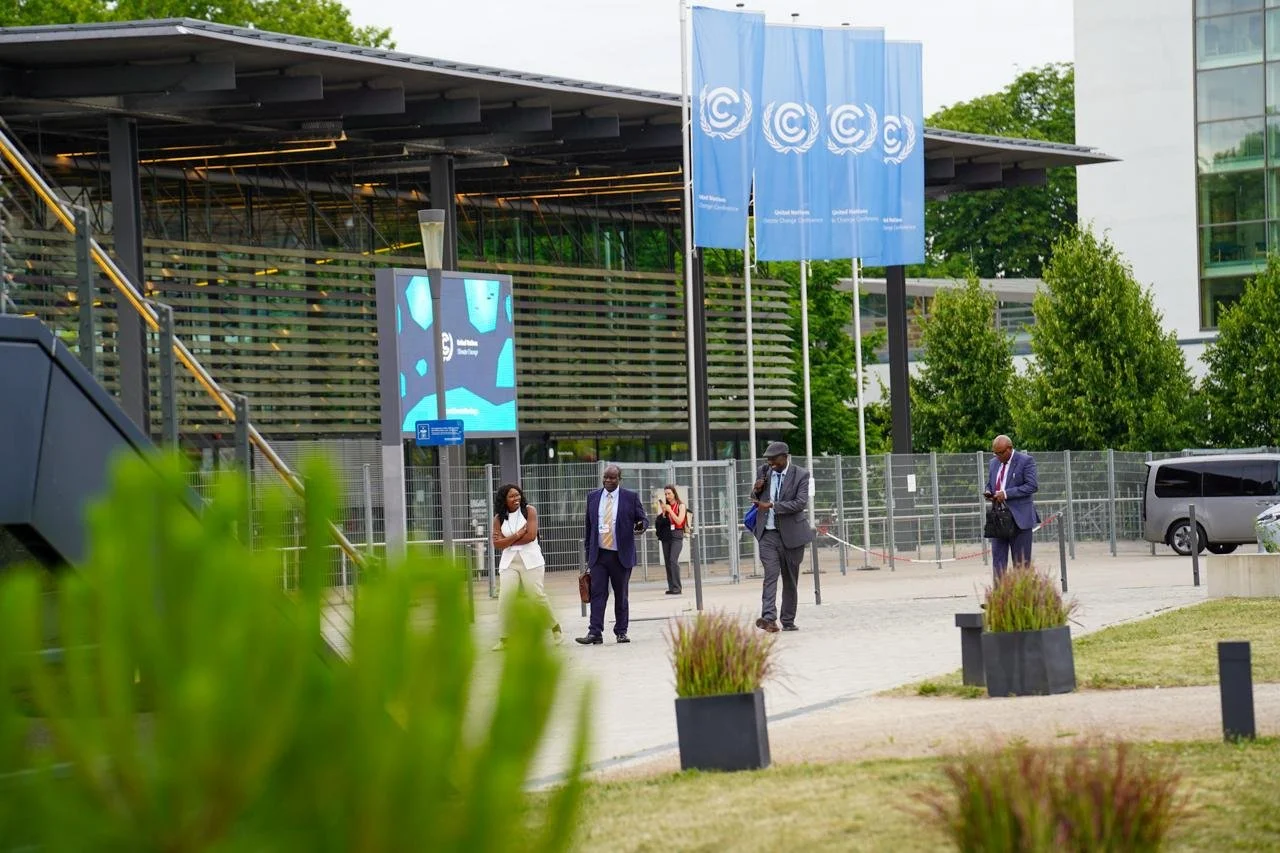Just Transition is our bet for a climate-resilient future
Outside venue at Bonn Climate Talks
BY ELIZABETH WANJA AND FREDRICK OTIENO
One of the biggest milestones for the Bonn climate talks this year was the progress made in the just transition discussions. For the first time, just transition priorities were tabled in negotiations, following years of pressure from social movements, campaigners and civil society organisations globally.
Just transition encompasses actions that help to manage the shift to a green and climate-compatible economy in a manner that is fair, just and inclusive, particularly for workers and frontline communities impacted by the climate crisis.
Initiated at COP28 in Dubai, the Just Transition Work Programme (JTWP) seeks to center justice in climate action. It is against this background that the outcome in Bonn was described by climate experts as ‘‘a major evolution’’ in climate action.
For years, climate justice has heavily focused on addressing the impacts of climate mitigation measures, including job losses arising from the energy transition from fossil fuels to renewables. This bias can partly be attributed to the transition movement that originated in the labour movement of the 1960s and 70s.
There has also been a discrepancy between developed and developing countries in terms of their approach to and priorities in these discussions.
On the one hand, developed countries’ conception of JTWP has traditionally focused on a narrow framework anchored on job security and social protection for formal workers.
On the other hand, developing countries propose a more elaborate and transformative JTWP that includes more stakeholders and concerns such as energy, informal and care workers, the means of implementation, justice and equity.
However, in the face of disproportionate greenhouse gas emissions, climate change impacts and the impacts of response measures, the concept has been adapted to address other concerns stemming from the climate crisis.
For the first time, this work programme provided a formal process to guide countries on how to shift to low-carbon economies in a fair, inclusive, and equitable way. Its bold vision is to explore pathways that support workers, communities and countries in managing the profound changes required to meet the goals of the Paris Agreement.
Crucially, the decision that established the JTWP acknowledged that this transformation must be rooted in social justice, equity and sustainable development.
Discussions under JTWP focus on bridging three critical gaps: scope, support, and systems. It’s for this reason that developing countries demand adaptation principles in the JTWP.
At SB 62, developing countries made a case for adaptation in the JTWP as part of the process to refine the structure of the work programme ahead of COP 30.
To build sustainable prosperity and to achieve emission neutrality, major shifts in livelihood patterns and sociocultural orientations are key. To keep this dream alive, we must recalibrate the global economic order in a regime founded on equity and justice.
Thankfully, developing countries are determined to leapfrog dirty energy to clean, renewable and sustainable forms. This will allow them to adopt the latest and most efficient energy technologies to spur rapid economic growth and development.
It is unjust for people who have contributed the least emissions to suffer the harshest socioeconomic inequalities and energy poverty. It’s even more unjust and unacceptable to fail to support them in transitioning to carbon-neutral economies through initiatives such as clean cooking.
At the Bonn climate talks, there was a strong push from African, Latin American and Small Island Developing States (SIDS) to have adaptation outcomes explicitly integrated in the JTWP. This position was supported by the African Group of Negotiators (AGN), the G77+China and the Least Developed Countries (LDCs).
Negotiators from these regions highlighted the link between the JTWP and the Global Goal on Adaptation (GGA). In particular, they argued the need to have the means of implementation, including finance and institutional support, to realise a just transition.
Collectively, they demanded that the Just Transition Work Programme reflect the lived realities of rising temperatures, extreme weather, food insecurity and water scarcity in their countries.
In this context, the energy transition cannot only be about reducing emissions; it must be about building the resilience of frontline communities as well.
Additionally, countries challenged sessions at COP 29 in Baku that sought to reinforce calls for the JTWP to retain its distinct identity and not be subsumed under mitigation mechanisms.
So, what is at stake?
If the push to include adaptation priorities into the JTWP succeeds and gets reflected in the final COP30 decision, it could mark a turning point in the climate discourse. It would position just transition as a central plank of delivering climate justice and resilience in a rapidly warming world.
Low-emitting developing countries emphasise that a true just transition must lift people out of poverty, expand economic opportunities and equip societies with the means to overcome climate instability. This means putting adaptation at the center —not the sidelines — of transition planning.
There is reason to look into the future with enthusiasm and hope. An informal note from SB 62 includes several adaptation principles and goals that could be considered in the JTWP negotiations at COP 30 in Belem.
A just transition win is within reach. Brazil can deliver this victory for humanity and the planet. The Amazonian COP stands on the cusp of history.
Elizabeth Wanja is the coordinator at Kenya Climate Change Working Group (KCCWG)
Fredrick Otieno is a Programs Officer at Power Shift Africa (PSA)

